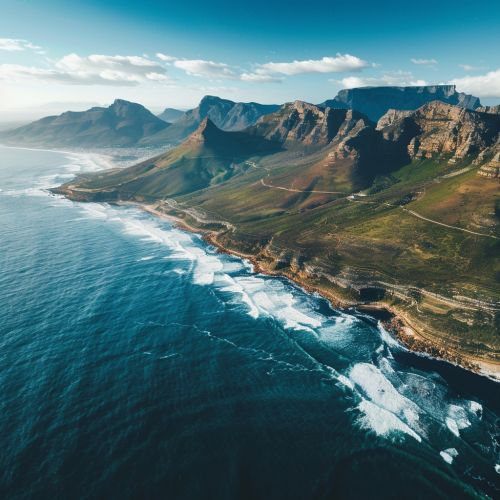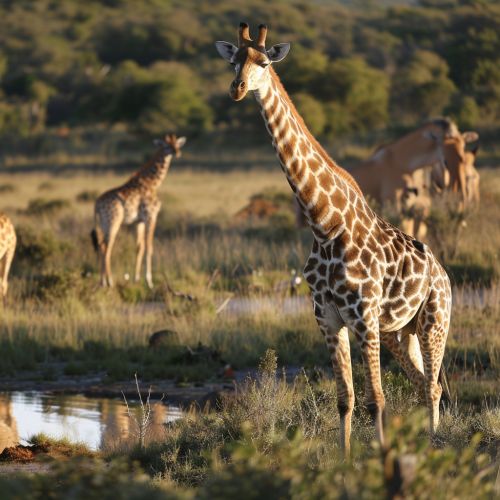South Africa
Geography
South Africa is located at the southernmost tip of the African continent. It is bordered by six countries: Namibia, Botswana, Zimbabwe, Mozambique, Swaziland, and Lesotho, which is an enclave surrounded by South African territory. South Africa's coastline stretches over 2,500 kilometers along the South Atlantic and Indian Oceans.

The country's interior consists of a vast plateau, with altitudes ranging between 1,000 and 2,000 meters. The plateau is mostly covered by grassland known as the Highveld, with the Kalahari Desert in the north-west. To the east, the plateau drops off to the Great Escarpment, which gives way to the low-lying, subtropical coastal plain known as the Lowveld.
Climate
South Africa has a diverse climate, ranging from desert in the west along the Namibian border, to subtropical in the eastern coastline. The Western Cape has a Mediterranean climate with winter rainfall, while most of the country experiences summer rainfall. The Drakensberg mountains, the highest range in southern Africa, have snowfall in winter.
Biodiversity
South Africa is one of the world's 17 megadiverse countries, with more than 20,000 different plants, or about 10% of all the known species of plants on Earth. It is home to the Big Five game animals: lion, leopard, rhinoceros, elephant, and Cape buffalo. South Africa has designated numerous national parks and biosphere reserves to preserve its biodiversity, including the famous Kruger National Park.

History
South Africa has a rich and complex history, with archaeological evidence suggesting that it has been inhabited for more than 100,000 years. The San people, also known as Bushmen, are believed to be the earliest inhabitants. They were followed by the Bantu peoples, who migrated from central Africa around 2,000 years ago.
The first Europeans to reach South Africa were the Portuguese, who named it the Cape of Good Hope in 1488. The Dutch established a colony in 1652, which was taken over by the British in the early 19th century. The discovery of diamonds and gold in the late 19th century led to an economic boom, but also to the Anglo-Boer War, as the British and the Boers, descendants of the Dutch settlers, fought for control of the territory.
In 1948, the National Party came to power and implemented the policy of apartheid, a system of institutionalized racial segregation and discrimination. This led to widespread international condemnation and sanctions. Apartheid ended in 1994, when Nelson Mandela was elected as the first black President in the first fully representative democratic election.
Politics
South Africa is a parliamentary republic, with the President serving as both the head of state and the head of government. The National Assembly is the lower house of Parliament, and the National Council of Provinces is the upper house. South Africa has a multi-party system, with the African National Congress being the dominant party since the end of apartheid.
The country's constitution, adopted in 1996, is regarded as one of the most progressive in the world, with a Bill of Rights that guarantees civil liberties and social-economic rights. South Africa has a mixed legal system, with Roman-Dutch civil law, customary law, and indigenous law.
Economy
South Africa has the second-largest economy in Africa, after Nigeria. It is a middle-income, emerging market with an abundant supply of natural resources, including gold, platinum, and chromium. The country has a well-developed financial, legal, communications, energy, and transport sectors. It also has a high rate of unemployment and poverty, with significant income inequality.
The country's economy is divided into three main sectors: agriculture, industry, and services. The agricultural sector includes crops such as maize, wheat, and fruits, as well as livestock. The industrial sector is dominated by mining, manufacturing, and construction. The services sector, including tourism, is the largest and fastest-growing sector of the economy.
Culture
South Africa is known as the Rainbow Nation because of its multicultural diversity. The country has 11 official languages, the most for any country. These include Afrikaans, English, Zulu, Xhosa, and Sotho. The country's diverse population is made up of African, European, Indian, and mixed-race communities.
South African cuisine is a blend of indigenous and foreign influences, with dishes such as bobotie, boerewors, and biltong. The country is also renowned for its wine, with the Cape Winelands being one of the world's largest wine producers.
South Africa has a vibrant arts scene, with a rich tradition of music, dance, and visual arts. It has produced world-renowned artists such as painter Irma Stern, novelist Nadine Gordimer, and singer Miriam Makeba. South Africa also has a strong sporting culture, with rugby, cricket, and soccer being the most popular sports.
